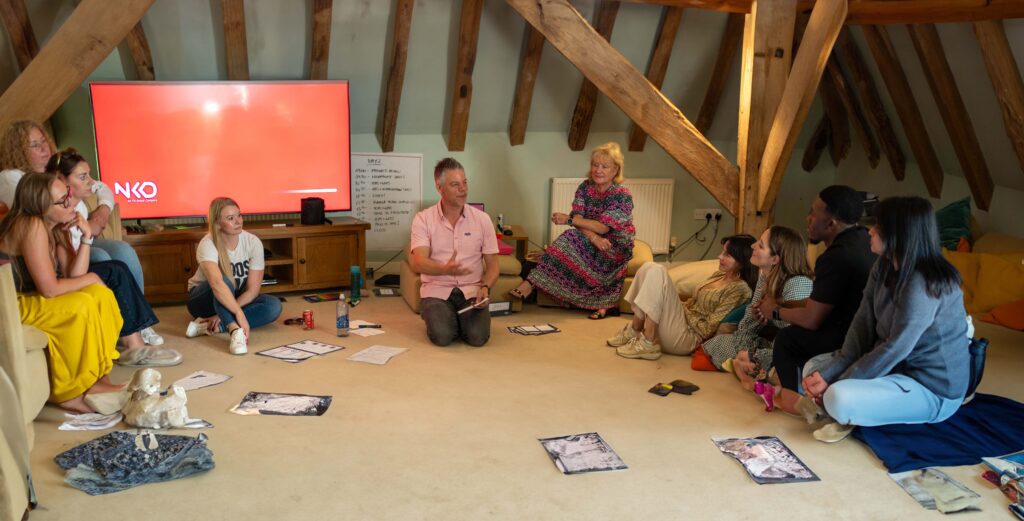As 2025 gets underway, leaders face increasingly complex and evolving demands. At NKD, we believe this new era will require resilience, adaptability, and innovative strategies to navigate uncertainty successfully. Here we share our insights on the trends that are reshaping leadership in 2025, and how senior leaders can harness these shifts to drive engagement, growth, and sustainability.
‘EX Winter’ – surviving the big freeze
In their Predictions 2024: The Future of Work report, Forrester found that companies have been putting employee experience on the back burner, leading to what they dubbed an ‘EX winter’ where businesses are deprioritising, or even freezing, their employee engagement initiatives.
It’s no secret that we live in testing times for businesses, with tightening budgets and waves of redundancies across many industries. While employee engagement initiatives can seem like a quick cost saving, we urge businesses not to be hasty. In the long term, employee disengagement can be much more costly. Research from Gallup says that
$8.8 trillion is the true annual global cost of low employee engagement – that’s a staggering statistic; a sum larger than the GDP of Japan or Germany.

Engaged teams are more likely to stay in their roles, navigate change confidently and remain committed to a business strategy which can massively reduce turnover and recruitment costs down the line. As senior leaders, you can help influence decisions by ensuring engagement is a strategic priority for your team. Ask yourself, how can you build a strategy that puts emphasis on authentic support and motivation for your teams? Need help getting everyone on the same page? We can help you achieve strategic alignment.
Finding nuance in the return-to-office debate
The return-to-office (RTO) issue continues to intensify, with many large companies mandating in-office attendance. Yet, we know that employees continue to value flexible and hybrid working very highly, as Amazon recently discovered when they received over 500 letters from employees calling to reverse an RTO policy. How can leaders respond to this ongoing debate effectively, and with nuance?
Just five years on from COVID’s transformative impact on work environments, there remains a tendency towards black-and-white thinking on the return-to-office issue, with assumptions that office-based working leads to greater collaboration, improved communication, and so on. While for some teams this may be true, the research is far from conclusive. That’s why we recommend focusing instead on your team’s outcomes and uncovering the root causes of any challenges. For instance, if your team is struggling to collaborate effectively, or finding communication on certain projects challenging, address these specific issues head on and explore the wider issue regardless of where team members are based. You may well find there are other issues at play which can be resolved or improved without the need for mandated office attendance.
If you want to read more on the RTO debate, click here.
Happiness – a workplace issue?
The latest Global Happiness Report revealed a troubling trend: young people in the UK are increasingly unhappy compared with older generations. As The Guardian reports,
“British people under 30 ranked 32nd in the rankings, behind nations such as Moldova, Kosovo and even El Salvador, which has one of the world’s highest murder rates.
By contrast British over-60s made it into the top 20 of the world’s happiest older generations. Earlier this month a majority of British teenagers told pollsters they expect their lives to be worse than the previous generation.”

What does this have to do with work? Well, everything. People spend roughly a third of their lives at work, and many young Gen Z and Millennial workers see their employment is more than ‘just a job’– it’s a source of stability, connection and purpose. As leaders, by cultivating a sense of community and belonging in the workplace, where company values are strong and purposeful, you can improve how people feel about coming into work and create a supportive and motivating environment which bridges the gap between expectations and workplace reality.
Sustainability in the supply chain
As global challenges around climate change escalate, leaders must adopt a future-focused approach, building workplaces and supply chains that are resilient, sustainable, and capable of adapting to change.
Creating a culture of continuous improvement is essential for driving the small, incremental changes that, over time, result in significant sustainability improvements. This involves actively identifying waste across all areas of the business and finding ways to reduce it. Lean businesses focus on addressing the eight primary causes of waste, continually seeking to minimise them.
To support this, processes should be designed to be simple and standardised, making it easy for employees to work sustainably within the established business frameworks. However, achieving this requires more than streamlined systems – it demands engaged and committed staff. Sustainability must be a shared focus, embraced from the top down and the bottom up, ensuring that every employee understands their role in driving incremental improvements each day.
The future of successful workplaces starts with visionary leadership. By helping leaders develop the right skills and adopt proactive strategies, we know that organisations can not only survive, but thrive, in this new era.
If you’re ready to explore how NKD can help your organisation get ahead of these trends, get in touch with us today.
